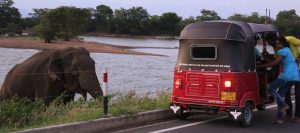
Human-wildlife conflict has over the years presented huge challenges for conservation agendas around the world. During a recent trip to Sri Lanka, Save the Elephants’ Human-Elephant Conflict team leader, Dr. Lucy King had a chance to interact with various stakeholders to learn more about human-elephant conflict (HEC) and explore the potential use of beehive fences as a HEC mitigation method for small-scale farmers in Sri Lanka. On the ground, there are organizations that are already working at finding solutions to the HEC. They include Practical Action and Born Free Foundation.
Practical Action’s Palmyra bio-fence project employs the concept of using the Palmyra tree to create a living bio fence to stop elephants from entering farms. The trees are planted in a zigzag pattern and their characteristic saw-tooth-edges makes it hard for elephants to penetrate. This project is potentially viable as the trees are flood and fire tolerant and can therefore can live up to 100years and withstand temperatures between 0-45 degrees. However, the Palmyra trees take up to 8 years to grow to an effective size that can serve as a barrier against elephants. Collaboration with Dr. Lucy King’s Elephants and Bees Project would see beehive fences erected to protect trial farms up until the trees grow large enough.
The Save the Elephants team also met with the Born Free Foundation. The foundation began work in Sri Lanka in 2002 and has been helping communities tackle their HEC issues through the work being done by Deepani Jayanthi (Country Representative) and Dr. Vijita Perera and his colleagues, at the Elephant Transit Home in Uda Walawe. One of the projects they have introduced is the Non-palatable crops project site in Rathambalagama village. Here, the farmers are encouraged to plant crops that are known to be non-palatable to elephants such as black pepper, ginger, turmeric, chilli, sesame and citrus. Since 2010, Deepani has collaborated with 30 local farmers. Born Free are monitoring the number of crop raids, the pattern of damage in the trial farms and how the farmers are adapting to the new ideas. The results will be of great interest to many HEC projects around Africa and Asia.
The Elephant Transit Home (ETH) houses and cares for injured and orphaned elephants with a policy of minimal human interaction so the elephants can be released back into the wild when older and healthy enough to survive independently. The educational experience and the ethos of releasing orphans back into the wild rather than selling them to captivity that the Elephant Transit Home is able to offer to school children, tourists and members of the public in Sri Lanka is invaluable.
The Elephant Forest and Environmental Conservation Trust conducts long-term monitoring of the elephant population in and around Uda Walawe National Park. Results from a successful collaborative paper between Dr Shermin de Silva and Save the Elephants’ Dr George Wittemyer on comparative social organization between Asian and African elephants using data from Uda Walawe project revealed a difference in social structure between African and Asian elephants. Asian elephants are found in smaller groups, do not maintain such coherent core groups, demonstrate markedly less social connectivity at the population level, and are socially less influenced by seasonal differences in ecological conditions. This difference in social structure emphasizes the need to conduct behavioural work with wild Sri Lankan elephants to help scientists understand how they might react to disturbed bees in the wild.
Other teams that contributed to the wealth of information include, the University of Maratuwa and Sri Lanka Wildlife Conservation society with the Ele-Alert system, an early warning system against elephant intrusion; Elephant Scientists at the University of Peradeniya and other bee experts.
Following this informative trip, the team concluded that beehive fence trials are worth establishing in Sri Lanka, especially since there are no additional financial costs to farmers and the benefits that come with beekeeping.

